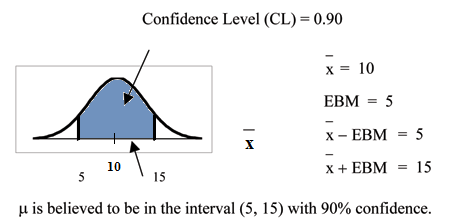| << Chapter < Page | Chapter >> Page > |
To construct a confidence interval for a single unknown population mean , where the population standard deviation is known, we need as an estimate for and we need the margin of error. Here, the margin of error is called the error bound for a population mean (abbreviated EBM ). The sample mean is the point estimate of the unknown population mean
The margin of error depends on the confidence level (abbreviated CL ). The confidence level is often considered the probability that the calculated confidence interval estimate will contain the true population parameter. However, it is more accurate to state that the confidence level is the percent of confidence intervals that contain the true population parameter when repeated samples are taken. Most often, it is the choice of the person constructing the confidence interval to choose aconfidence level of 90% or higher because that person wants to be reasonably certain of his or her conclusions.
There is another probability called alpha (
).
is related to the confidence level CL.
is the probability that the interval does not contain the unknown population parameter.
Mathematically,
+ CL = 1.
7 and 2.5.
The confidence interval is ; calculating the values gives .
If the confidence level (CL) is 95%, then we say that "We estimate with 95% confidence that the true value of the population mean is between 4.5 and 9.5."
A confidence interval for a population mean with a known standard deviation is based on the fact that the sample means follow an approximately normaldistribution. Suppose that our sample has a mean of and we have constructed the 90% confidence interval (5, 15)where .
To get a 90% confidence interval, we must include the central 90% of the probability of the normal distribution. If we include the central 90%, we leave out a total of = 10% in both tails, or 5% in each tail, of the normal distribution.

To capture the central 90%, we must go out 1.645 "standard deviations" on either side of the calculated sample mean. 1.645 is the z-score from a Standard Normalprobability distribution that puts an area of 0.90 in the center, an area of 0.05 in the far left tail, and an area of 0.05 in the far right tail.
It is important that the "standard deviation" used must be appropriate for the parameter we are estimating. So in this section, we need to use the standard deviation that applies to sample means, which is . is commonly called the "standard error of the mean" in order to clearly distinguish the standard deviation for a mean from the population standard deviation .

Notification Switch
Would you like to follow the 'Elementary statistics' conversation and receive update notifications?